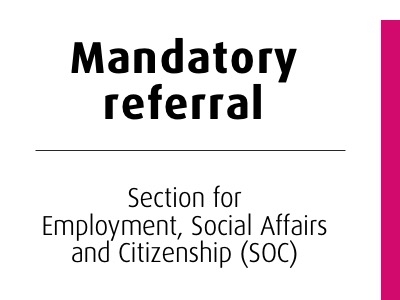European Economic
and Social Committee
Talent Mobility Package
Background
A skilled workforce is a must for the competitiveness of the EU economy, its capacity for growth and innovation. Employers are struggling to find the workers they need, and the EU urgently needs to take action to boost its workforce. Labour shortages in the EU affect a variety of occupations and sectors across all skill levels, including healthcare, long term care and social work activities, construction, manufacturing, transportation and storage, accommodation and food services, engineering, technical and scientific activities and Information and Communications Technology (ICT).
There are foreseeable skills gaps in key areas as the EU adapts to a changing world. (With the right policies in place, the green transition will create 1 to 2.5 million additional jobs by 2030. The digital transition will increase demand for both high-level ICT expertise but also basic digital skills, with the EU currently 11 million short of its target of 20 million ICT professionals employed by 2030).
The Commission’s Talent Mobility Package includes several policy initiatives on mobility and migration for education and employment purposes for both EU and non-EU nationals. The package will impact national policies dealing with migration, employment, qualifications and international mobility in education to propose possible solutions for developing actions in the current context of labour and skills shortages.
The European Economic and Social Committee (EESC) emphasises the critical challenges posed by labour and skills shortages across the EU, particularly in disadvantaged regions. It stresses the importance of the EU Talent Pool (TP) as a practical tool for addressing these shortages, advocating for its attractiveness to both workers and employers, and supporting fair labour migration.
Additionally, the EESC highlights the underutilised potential of third-country nationals already in the EU, emphasising the need for their integration into the labour market. It calls for a welcoming environment for migrant workers, aiming to counter hostile attitudes towards migration. Moreover, the EESC recommends aligning the TP initiative with the EU Harnessing Talent initiative to prevent brain drain and promote circular migration.
Key points:
In the opinion, the EESC:
- stresses the importance of making the EU Talent Pool user-friendly and trustworthy for both workers and employers, facilitating fair labour migration by matching skills with job opportunities and recognising qualifications obtained abroad;
- welcomes the recommendation that aims to simplify procedures for third-country nationals to access employment by validating skills, competencies, and qualifications, reducing administrative burdens and accommodating challenges faced during migration;
- calls on the Member States to ensure public investment in schools and educational institutions so that they can provide quality and trustworthy guidance and advice on learning mobility opportunities supporting career development and lifelong learning.
The text of the draft opinion can be found here.
Additional information
Section: Employment, Social Affairs and Citizenship (SOC)
Opinion number: SOC/786
Opinion type: Mandatory
Rapporteur: Tatjana BABRAUSKIENĖ
Co-rapporteur: Mariya MINCHEVA
Reference: COM(2023) 715 final COM(2023) 716 final 2023/0404 COD COM(2023) 716 final 2023/0404 COD COM(2023) 719 final 2023/0405 NLE COM(2023) 719 final 2023/0405 NLE
Date of adoption by section: 12/04/2024
Result of the vote: 175 in favour/0 against/0 abstention
Date of adoption in plenary: 25/4/2024
Result of the vote: 187 in favour/ 1 against/ 3 abstentions
Contacts:
Press officer: Simran Grewal/Laura Lui
Tel.: 00 32 2 546 9189
email: Simran.grewal@eesc.europa.eu / laurairena.lui@eesc.europa.eu
Administrator: Triin Aasmaa Gomes
Tel.: +32 2 546 9524
email: Triin.AasmaaGomes@eesc.europa.eu
